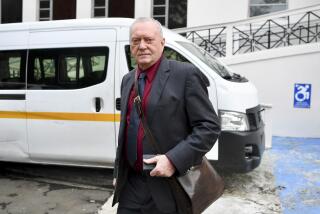Some Convictions of 4 Merrill Execs Reversed
- Share via
DALLAS — A federal appeals court has reversed several convictions against four former Merrill Lynch & Co. executives found guilty of helping engineer Enron Corp.’s 1999 sale of mobile power plants to the brokerage to help the energy trader appear to have met earnings targets.
The three-judge panel of the 5th U.S. Circuit Court of Appeals on Tuesday found fault with the government’s theory of fraud that led to the wire fraud and conspiracy convictions of James A. Brown, William Fuhs, Daniel Bayly and Robert S. Furst. Bayly is Merrill’s former head of investment banking.
The panel also ruled that the evidence was insufficient in Fuhs’ case but upheld Brown’s perjury and obstruction of justice convictions.
They were among five former executives found guilty of one count of conspiracy and two counts of wire fraud in November 2004 in connection with the sham sale of power barges anchored off the coast of Nigeria.
The four defendants had appealed on several grounds, including problems with jury instructions and the government’s arguments of criminal liability and deprivation of honest services.
The appeals court said the scheme fell outside the limits of honest-services fraud because the executives acted to ensure that the company benefited and not themselves personally.
The panel said it did not need to address the defendants’ other appeals claims because its assessment of the flawed honest-services component was sufficient to make the ruling.
The barges were the primary asset of Enron’s energy division in 1999, and the company was pressured to sell them to show a gain and meet its earnings targets. But several deals collapsed and Enron turned to Merrill Lynch, which bought the assets to make Enron’s earnings appear larger.
The four defendants were tried together along with two other executives: former in-house Enron accountant Sheila Kahanek and former mid-level Enron finance executive Dan O. Boyle.
Kahanek was acquitted. Boyle was found guilty of conspiracy, fraud and lying to congressional investigators. He did not appeal his conviction.
A federal appeals court ruled in June that Bayly and Furst could post bond and be released from prison pending their appeals.
More to Read
Inside the business of entertainment
The Wide Shot brings you news, analysis and insights on everything from streaming wars to production — and what it all means for the future.
You may occasionally receive promotional content from the Los Angeles Times.










